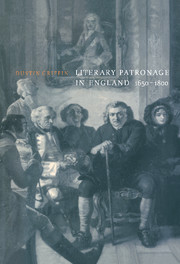Book contents
- Frontmatter
- Contents
- Acknowledgments
- 1 Introduction
- 2 The cultural economics of literary patronage
- 3 The politics of patronage
- 4 John Dryden
- 5 Jonathan Swift
- 6 Alexander Pope
- 7 Edward Young and Richard Savage
- 8 Mary Leapor and Charlotte Lennox
- 9 Samuel Johnson
- 10 The persistence of patronage
- 11 Conclusion
- Bibliography
- Index
2 - The cultural economics of literary patronage
Published online by Cambridge University Press: 22 August 2009
- Frontmatter
- Contents
- Acknowledgments
- 1 Introduction
- 2 The cultural economics of literary patronage
- 3 The politics of patronage
- 4 John Dryden
- 5 Jonathan Swift
- 6 Alexander Pope
- 7 Edward Young and Richard Savage
- 8 Mary Leapor and Charlotte Lennox
- 9 Samuel Johnson
- 10 The persistence of patronage
- 11 Conclusion
- Bibliography
- Index
Summary
My thesis in this chapter is that literary patronage is a systematic economic arrangement, a complex exchange of benefit to both patron and client. I use the term “economics” to emphasize that significant goods and services are exchanged. “Cultural economics” tries to suggest that patronage is not simply money and housing in exchange for printed dedications; that economics in eighteenth-century society, still based on rank and honor, needs to be understood broadly; and that what is ultimately at stake is the control of high literary culture.
We have neither an adequate history nor a comprehensive and coherent theory of literary patronage. Most studies of literary patronage have been biographical in their focus, descriptive rather than analytic, and relatively innocent of theoretical method. Such scattered theoretical remarks as we have imply that cultural patronage is not economic behavior. Dedicating authors sometimes claim that their patrons act from the simple “pleasure” of doing good.” Such claims may seem to us to be little more than credulous compliments. But before we dismiss them, we should consider that they reflect cultural habits no longer familiar to us – an eighteenth-century preoccupation with the various forms of “pleasure,” and the traditionally aristocratic practice of publicly displayed generosity. To understand, for example, what lies behind Fielding's claim that “the communication of benefits to others” is “accompanied with a very delicious relish upon the mind of him that practices it” requires some reconstruction of the relationship between the giver and receiver of “benefits.”
- Type
- Chapter
- Information
- Literary Patronage in England, 1650–1800 , pp. 13 - 44Publisher: Cambridge University PressPrint publication year: 1996



